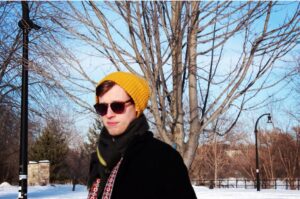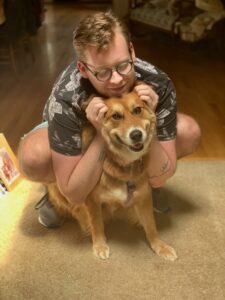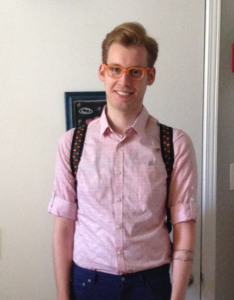When Josh Hall was an English major at UW-Parkside, he hated his few online courses.
“I don’t think I ever completed one,” Josh said. “I would make it to the deadline and drop each online course. I always felt like the expectations and schedules were unclear. I also didn’t like when my online courses were synchronous because I felt like the internet didn’t accommodate this type of learning very well at the time. I longed for an online course where I could be in control of how and when I participate and complete my work.”
 After earning his bachelor’s degree, Josh went on to complete Trent University’s interdisciplinary Theory, Culture, and Politics Master’s Program, in Peterborough, Ontario. Upon completion, Josh returned to UW-Parkside as an associate lecturer in the English and Liberal Studies departments, with focuses on cultural studies, social justice and anti-racism. He was given the responsibility of designing the first version of the online UWX LB103: Diversity in the U.S., which he teaches for the 100% online Associate of Arts and Sciences (AAS) degree from the University of Wisconsin. Remembering his unfavorable experience with online courses, he was motivated to create courses that his students would enjoy taking.
After earning his bachelor’s degree, Josh went on to complete Trent University’s interdisciplinary Theory, Culture, and Politics Master’s Program, in Peterborough, Ontario. Upon completion, Josh returned to UW-Parkside as an associate lecturer in the English and Liberal Studies departments, with focuses on cultural studies, social justice and anti-racism. He was given the responsibility of designing the first version of the online UWX LB103: Diversity in the U.S., which he teaches for the 100% online Associate of Arts and Sciences (AAS) degree from the University of Wisconsin. Remembering his unfavorable experience with online courses, he was motivated to create courses that his students would enjoy taking.
“I wanted to use my past frustrations with online learning and channel that into carefully making a course that I would want to take, given the experiences that I had before,” Josh said. “I think I’ve done that. I structure each lesson in my course around a text, with the same assignments occurring in each lesson, so students can know what to anticipate throughout the term. The course is also designed to be asynchronous.”
UWX LB103: Diversity in the U.S. exposes students to the diverse bodies, minds, and backgrounds that make up America. Students gain an understanding about how they exist within, and contribute to, our country’s diversity. 2020 has spotlighted social issues around diversity like never before. As a result, families, communities, and employers are having open conversations about diversity, equity, and inclusion.
When did you realize that you wanted to be a teacher?
 I became interested in teaching toward the end of my bachelor’s degree. I realized I went from being the student who didn’t like being in the spotlight to feeling like I had something to say. I felt like I had a purpose and that I had ideas that were worth collaborating with others on.
I became interested in teaching toward the end of my bachelor’s degree. I realized I went from being the student who didn’t like being in the spotlight to feeling like I had something to say. I felt like I had a purpose and that I had ideas that were worth collaborating with others on.
My interest in education strengthened while in graduate school when learning about the importance of different voices and opinions within our society. If I can use my platform to uplift other people that might not have the privileges I’ve had, then I want to take full advantage of that.
Now, I teach several different courses on campus at UW-Parkside, along with UWX LB103: Diversity in the U.S. for Wisconsin Online Collaboratives’ online AAS program.
How did you develop a diversity course that effectively fits an online format?
It’s important to consider that everyone functions differently, especially when developing an online course. In UWX LB103, students can absorb content throughout the week on their own schedules, and the assignments serve as opportunities for the students to express what they’re learning. These assignments encourage students to think critically about social justice by interacting further with the material and listening to other students’ experiences.
I also enjoy collaborating with my students in this course, but in an unconventional way given the online format. The students are given opportunities to process the multitudes of experiences that they’re reading about, and they get a second or third attempt to soak up everything that they possibly can through continued discussions and assignments.
Why is it important for students to take a diversity course?
You can’t be successful in your academic and professional careers without being able to acknowledge and appreciate someone else’s experiences, especially if they are different from yours. Upon completion of this course, I hope students are able to observe, think, and speak more thoughtfully.
 Social justice has to be dynamic. I can create opportunities for students to understand this, but they need to be out in the world, in their own home, or academic or work environments outside of this course, in order for some of those other pieces to fall into place. After this course, I hope they’re able to observe, and think, and speak more thoughtfully.
Social justice has to be dynamic. I can create opportunities for students to understand this, but they need to be out in the world, in their own home, or academic or work environments outside of this course, in order for some of those other pieces to fall into place. After this course, I hope they’re able to observe, and think, and speak more thoughtfully.
How do you help students who are struggling with course material?
I encourage students to be communicative and inquisitive, especially if they’re struggling, and I’m always available to answer questions. If they’re feeling stuck in my course because the content is overwhelming, then I encourage them to take the time and the space to process the material in the way that they are best able to.
What advice do you have for current and prospective students?
Students should consider the program if they’re ready to prepare their minds for a more enriching future. The online UW AAS program provides students a structured plan for growth from an academic format into a professional future. For students who have already chosen to join the UW AAS program, you’ve already made an excellent choice for yourself and for your future. Keep envisioning that future as you progress in the program.
Ready to enroll in the 100% online UW Associate of Arts and Sciences (AAS) program? Contact an enrollment adviser Monday through Friday from 8:30 a.m. to 5 p.m. CT; or by appointment. Call 608-262-2011 or email learn@uwex.wisconsin.edu.










